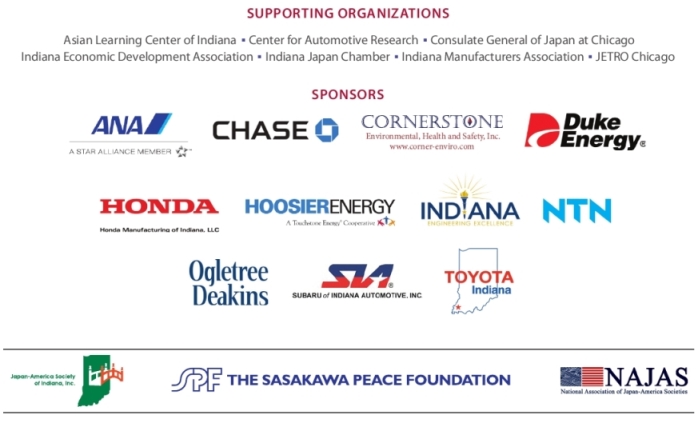
Conference Summary
prepared by
Paul Roland, Volunteer, and the JASI Staff
additional photos and sponsors following the report
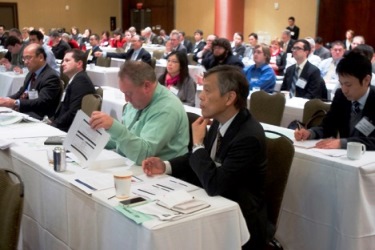
Japan Update Conference 2013
On February 27, 2013, the “Japan Update 2013” took place at the Hyatt Regency in Indianapolis, Indiana. The conference was presented by the Japan-America Society of Indiana (JASI) and the National Association of Japan-America Societies, with special support from The Sasakawa Peace Foundation and JASI Corporate Sponsors. The “Japan Update” conference commenced with a keynote luncheon, followed by two presentations and three panel discussions. The event was attended by 200 guests from throughout the country, including Texas, Pennsylvania, Kentucky, Illinois, Michigan, Ohio, Washington, D.C., and other states. JASI thanks the many corporate sponsors and partner organizations whose support made possible this successful event.
Mr. Tom Easterday, President of Subaru of Indiana Automotive, Inc., and President-Elect of JASI, opened the luncheon. He provided background on the conference and the importance of Japan-America Societies throughout North America. He thanked the National Association of Japan-America Societies and welcomed the representatives from the regional Japan-America Societies.
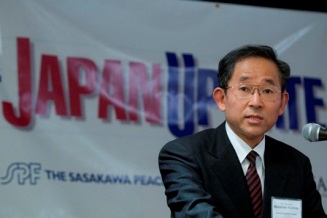
The Honorable Masaharu Yoshida
Consul General of Japan at Chicago
The Honorable Masaharu Yoshida, Consul General of Japan at Chicago, delivered welcome remarks at the luncheon. Consul General Yoshida singled out Indiana by explaining that only Guangzhou, China (where he previously served as Consul General) and Indiana possess three major Japanese automotive assembly plants, in addition to many suppliers. Approximately two years have passed since the Tohoku Earthquake and Tsunami on March 11, 2011, and Japan has almost fully recovered and moved forward, although it is generally thought that much more needs to be done with regard to housing and other conditions. Consul General Yoshida noted the deep thanks of the Japanese people for Operation Tomodachi, the relief effort launched by the U.S. Government. He also thanked JASI for its remarkable efforts, raising $900,000 in relief and aid donations. Consul General Yoshida noted the special significance of Indiana as one of three cities in the United States chosen to host the Japan Update Conference. In conclusion, Consul General Yoshida emphasized that the Japan-US relationship is indispensable, stressing peace, stability, and the keen desire to develop more opportunities for cooperation.
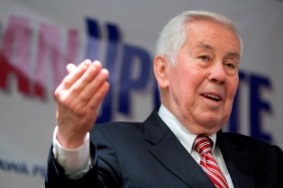
The Honorable Richard Lugar
Former United States Senator
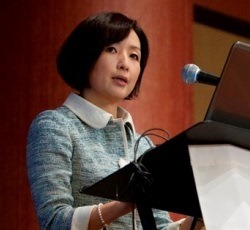
Ms. Aiko Doden
Senior Commentator on International Affairs
NHK Japan Broadcasting Corp.
Ms. Doden delivered the conference’s opening address, entitled “Asian voices and the US-Japan relationship in 2013.” The host of the television program “Asian Voices,” she provided insight into the current U.S.-Japan relationship, explaining that her program seeks to convey the atmosphere of trends and current events. In this regard, she discussed three aspects of Japan: how Japan defines its relationship with Asia in light of the U.S.-Japan relationship, the role of Japanese women, and the seemingly assertive military stance Japan has taken regarding the Senkaku Islands dispute.
Ms. Doden noted that the relationship between the U.S. and Japan is vibrant. Reasons why include an even stronger bond of friendship based on the goodwill following the 3.11 Tohoku Earthquake and Tsunami disasters. She characterized the U.S.-Japan relationship as durable and unaffected by the political party in power. Asia is in a rebalancing stage, and combined with this will be the matter of strategically engaging Asia. By 2025, the region’s combined gross domestic product will be unprecedented, and Japan needs to engage Asia in order to revitalize itself. Ms. Doden described the role of women in Japan and Asia, and noted the paucity of female managers in the Japanese labor market. Given her position, Ms. Doden is often the only woman in the room for business discussions. As a consequence of its rapidly aging society, Japan must find new ways of raising labor. Japan will not be able to reinvent itself without change, which will necessarily include women. Addressing the hawkish sentiment in Japan, Ms. Doden discussed the Senkaku Islands conflict. Contrary to media portrayals, while people in Japan admire their country standing up for itself, there is the realization that this will cause a deterioration of the relationship with China. Only a very few want force and 58% of people do not want to amend the Japanese Constitution to permit Japan to engage in war. Despite strong rhetoric, Japan has a moderate society; people want a peaceful, prosperous Japan. In conclusion, Ms. Doden urged Americans to visit Japan and meet real Japanese people. Her remarks highlighted the keen interest in Japan toward the U.S.
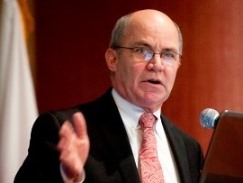
Dr. Peter Kelley, President
National Association of Japan-America Societies
Following Ms. Doden’s presentation, Dr. Peter Kelley, President of the National Association of Japan-America Societies (NAJAS), provided an overview of the organization. NAJAS helped develop the Japan Update conference, and the national network consists of 37 member societies throughout North America. Representatives from the regional Japan-America Societies throughout the Midwest attended the conference to observe the Japan Update Conference as a model and to strengthen their network.
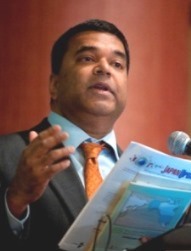
The Honorable Richard Lugar
Former United States Senator
Dr. Satu Limaye gave the second presentation. He is Director of the East-West Center in Washington and the Director of the Asia Matters for America Initiative. The East-West Center serves as a resource to promote better relations and understanding among the people and nations of the United States, Asia, and the Pacific through cooperative study, research, and dialogue. As part of the Japan/ Asia Matters for America Initiative, Dr. Limaye introduced the “Japan Matters For America” Resource Database, which uses and features an interactive website allowing for comparisons across states vis-à-vis Japan. The database contains articles, analysis, and a wealth of data. The articles included a special report highlighting how Japan and Indiana have cultivated strong linkages in diverse areas. One of the more important features of the database is the ability to trace interactions by state and congressional district. Dr. Limaye used the Japan-Indiana relationship as an example. The database contains key figures on export values and composition, imports, investing, education, sister cities, Indiana Governor visits and state outreach to Japan, people to people connections, and organizations, including the JASI and the Indiana Japan Chamber.
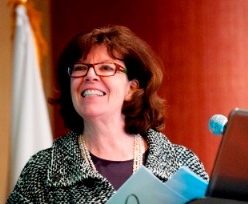
Dr. Sheila Smith, Senior Fellow
Council on Foreign Relations
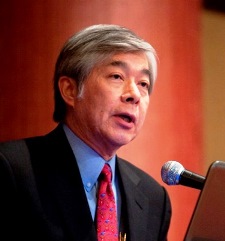
Dr. Glen S. Fukushima, Senior Fellow
Center for American Progress
Following Dr. Smith, Dr. Glen S. Fukushima, Senior Fellow at the Center for American Progress, gave his presentation on “Japan’s New Optimism: Corporate, Social, and Political Trends in 2013.” Dr. Fukushima, a former Deputy U.S. Trade Representative for Asia, has a wealth of business experience as an executive in Japanese subsidiaries for global companies. His presentation concerned four topics: Japanese politics, business, society, and the TPP (Trans-Pacific Partnership) free trade agreement. Regarding Japanese politics, Dr. Fukushima recalled that the Lower House parliamentary election of Dec. 16, 2012 marked the return of not only the Liberal Democratic Party of Japan, but also Prime Minister Abe, the bureaucracy, and the return of “normalcy.” On business, Dr. Fukushima commented on the economic stagnation which has been replaced with optimism, new economic policy, and corporate imperatives. Concerning society, Dr. Fukushima noted the insularity of Japanese youth, the status of women, immigration reforms, and Japan’s over-65 population, which will spur advancements in products & services, as well as health care and recreation. Finally, Dr. Fukushima gave an overview of the TPP free trade agreement. Although there has been staunch opposition by Japanese agricultural and medical interests, Prime Minister Abe’s meeting with President Obama on February 22, 2013, resulted in a joint statement that all goods were subject to negotiation, but no commitment for unilateral elimination for all tariffs was required. In conclusion, the TPP will represent another step toward regional trade cooperation for Japan and participation will further enhance Japan’s imports to the US.
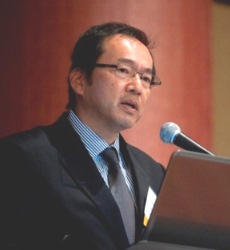
Mr. Masato Otaka
Minister for Public Affairs
Embassy of Japan in Washington, DC.
The first panel’s final speaker was Mr. Masato Otaka, the Minister for Public Affairs at the Embassy of Japan in Washington, D.C.. Mr. Otaka’s presentation was “Japan’s New Economic Policies: The Three Arrows of Monetary, Fiscal, and Industrial Competitiveness.” Mr. Otaka discussed Prime Minister Abe’s economic policies, which have three strategic arrows: bold monetary, flexible fiscal, and growth strategies for promoting investment. The aims of these policies include post-quake reconstruction and disaster prevention, creation of wealth through growth, and ensuring a sense of security in daily life and revitalizing the regions. For success, three tasks must be accomplished by adapting to changing conditions: internationalization, decentralization, and marketing. In sum, Mr. Otaka stressed that much work needs to be done and success ultimately depends on companies and the government.
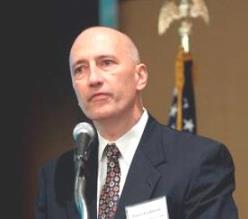
Dr. Pawel Fludzinski, President Emeritus
Japan-America Society of Indiana
(Eli Lilly & Co.,)
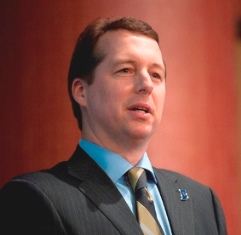
Mr. Eric Doden, Chief Executive Officer
Indiana Economic Development Corporation
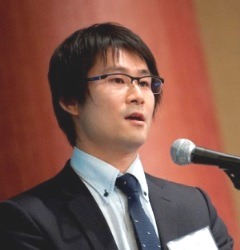
Mr. Ko Hikasa, Consul
Consulate General of Japan at Chicago
Mr. Ko Hikasa, Consul, Consulate General of Japan at Chicago, discussed the “Japanese Direct Investment Survey.” Mr. Hikasa explained that Indiana is one of the top states in the U.S. for doing business with Japan and that Japan is Indiana’s largest foreign employer. The Consulate General conducts direct investment surveys as a tool to understand FDI. In Indiana, 213 Japanese business facilities provide 42,610 jobs, and Indiana is the only state with three Japanese vehicle assembly plants. Mr. Hikasa stressed Indiana’s keys to attracting investment: economic development missions to Japan over years, government leadership that welcomes Japanese companies, and the State of Indiana office in Nagoya, Japan. In conclusion, Japan has a very close business relationship with Indiana, and over the long term, Japanese companies have proven to succeed and prosper here.
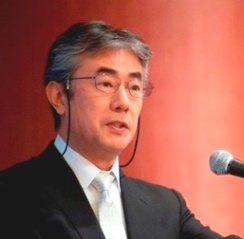
Mr. Tatsuhiro Shindo, Chief Executive Director
JETRO Chicago
Finally, Mr. Tatsuhiro Shindo, the Chief Executive Director,
JETRO (the Japan External Trade Organization) Chicago, gave his panel discussion on “The Midwest: Indiana : Japan Dynamic, Trade + Investment + Culture = Kizuna Among Us.” Mr. Shindo’s presentation covered four points: JETRO Chicago’s activities, Japanese Midwest manufacturing investment, the Midwest’s innovative companies in Japan, and the growth of Kizuna (in English, bonds or ties) among us. JETRO provides a host of business services, including consultation and market research among others. Mr. Shindo pointed out that Japanese manufacturing facilities Indiana alone have risen from 12 in 1987 to 112 in 2012, in addition to many other service and logistics firms. Mr. Shindo then focused on JETRO’s assistance to Vera Bradley, the Indiana apparel manufacturer, beginning in 2009. The keys to its success include a genuine interest in and support for Japan from senior management, a willingness to listen, a passion for relationship building, and an intense commitment to building its brand in Japan. Mr. Shindo concluded with examples of Kizuna that exemplify the human dynamic of the Midwest-Japan relationship, and also complemented the Japan-America Society of Indiana for its leading role in building connections and friendships between Indiana and Japan.
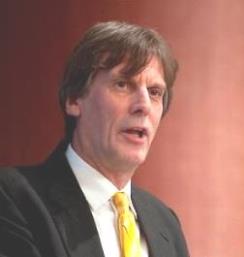
Dr. Kim Hill, Director
Center for Automotive Research
The third and final panel for the conference discussed “Perspectives from the Japan-Related Automotive Industry.” Dr. Kim Hill, a director at the Center for Automotive Research, served as both moderator and panelist. In Indiana, original equipment manufacturer (OEM) investments totaled $486.8 million and the recent creation of 873 new jobs. Suppliers made 23 investments, totaling $322.5 million and creating 2,192 new jobs. All OEM investments were made by Japanese companies, and Japanese-owned suppliers contributed 48% of new supplier investment dollars and 16% of new supplier employment ($160.2 million and 344 new positions). Supply chain changes were also discussed, as changes in production ripple on down the supply chain. He emphasized the strain that heightened production is causing the suppliers, but on the bright side, the quest for more production capacity points to opportunities for new suppliers to find a place in the chain. In closing, Dr. Hill stressed that companies should ask themselves key questions to address current opportunities as well as the need for unprecedented cooperation in public-private partnerships and private-private partnerships.
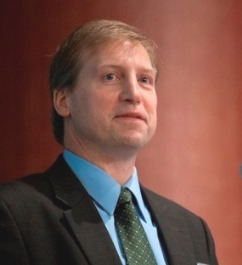
Mr. Bob Nelson, President
Honda Manufacturing of Indiana, LLC.
The next panelist was Mr. Bob Nelson, who, on April 1, 2013, will become the next President of Honda Manufacturing of Indiana, LLC. Mr. Nelson noted that automakers showed increased sales of hybrid vehicles and that hybrid and electric automobiles represented the fastest growth. Honda has made $800 million in capital investments in Indiana, currently employs approximately 2,000 associates, and is capable of producing 250,000 vehicles per year. Its products include the Honda Civic sedan, and it is the exclusive producer of the Civic Natural Gas and the Acura ILX. Honda is projecting strong growth over the next four years which will in turn mean growth for its supplier base in the Midwest. It has more than 500 U.S. suppliers. By 2014, Honda will export more vehicles from North America than it imports.
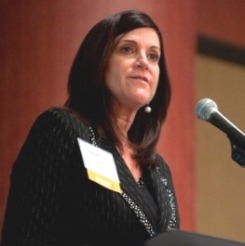
Ms. Melanie Hart, President
TASUS Corporation
Ms. Hart explained that TASUS and Tsuchiya Co.’s strategy in recessionary times required decades of long-term thinking and forbearance of short-term gains as development was not profitable in the early years. Companies should innovate and develop new technologies and make operational improvements, while planning for growth and positioning. She provided examples on how the company implemented strategies by making use of untapped employee creativity to effect operational improvements. She stressed that companies should take a look at being better manufacturers during recessionary times in order to become more effective. Technological advancements were also implemented by working on weight reduction and with electric and hybrid automobiles. TASUS has capitalized on its creativity during recession periods.
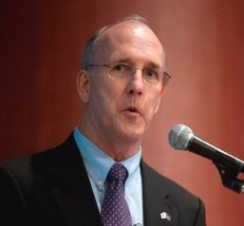
Mr. Tom Easterday, President-Elect
Japan-America Society of Indiana
(Subaru of Indiana Automotive, Inc.)
The final panelist was Mr. Tom Easterday, who in addition to being President-Elect of JASI, is also the Executive Vice President of Subaru of Indiana Automotive, Inc. First reviewing the drivers for growth, Mr. Easterday noted that over 400,000 Americans work for Japanese auto manufacturers or dealers. Mr. Easterday then examined volume forecasts, increased sales, and the seasonally adjusted annual rate for the U.S. auto market. Market share data revealed that in January, four Japanese automotive manufacturers are ranked among the top ten nationally, and that three of them build in Indiana. He noted that sales of the Subaru Outback have tripled and those of the Subaru Legacy have doubled because of pent-up demand, easy credit, and newer models with greater fuel economy. Mr. Easterday explained that logistics are driving investment. Further, increases in line speed result in increased investment and employment and, therefore, the tax base of the community and their disposable income. Regarding the Yen exchange rate, Mr. Easterday noted it has become more expensive to import parts and vehicles. Thus, Japan FDI has increased in the U.S.. Corporate social responsibility was also mentioned: whenever Japanese invest, there are increased jobs for Hoosiers and increased tax revenues. Additionally, as corporate social responsibility increases, the contribution to society does as well.
Mr. Easterday concluded with thanks and appreciation to all speakers, and to the staff of the Japan-America Society of Indiana who engineered the conference. He thanked the volunteers as well as the participants for making the 2013 Japan Update Conference a resounding success.
The Japan Update 2013 was made possible by funding from The Sasakawa Peace Foundation and JASI Corporate Sponsors: All Nippon Airways, Chase, Cornerstone Environmental Health and Safety, Duke Energy, Honda Manufacturing of Indiana, Hoosier Energy, The Indiana Economic Development Corporation, NTN Driveshaft, Ogletree Deakins, Subaru of Indiana Automotive, and Toyota Motor Manufacturing, Indiana.
Please see detail program here.
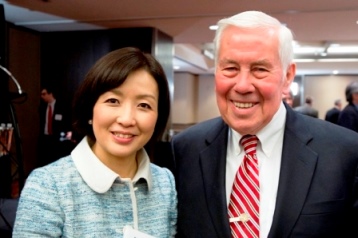 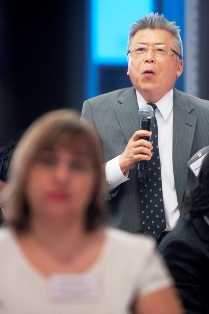 |
||
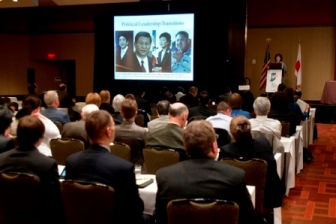 |
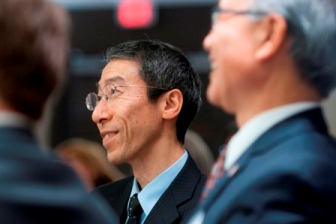 |
|
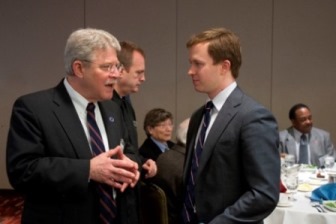 |
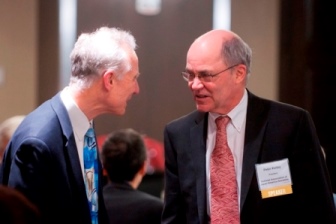 |
|
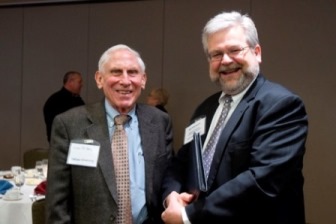 |
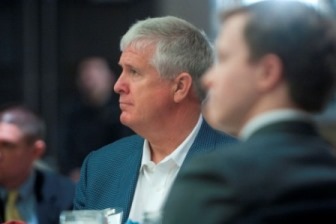 |
|
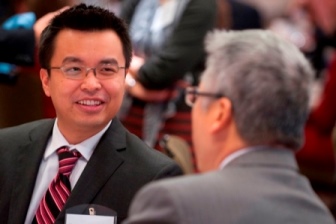 |
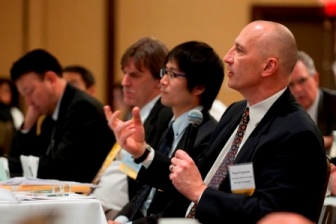 |
|
Professional photographs by John R. Gentry, Jr.
